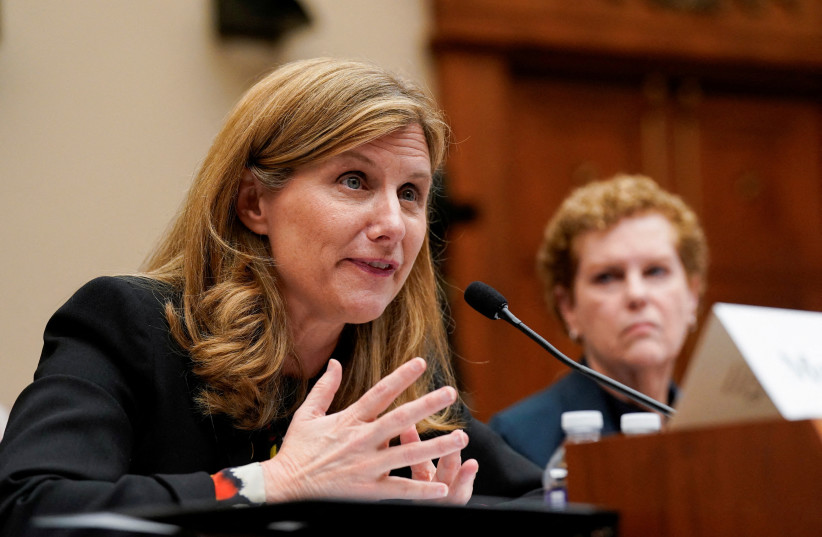Call it a sign of the times.
On December 8, two days after the presidents of three prestigious East Coast US universities were unable to tell a Congressional committee that calling for the genocide of Jews on campus violates their schools’ codes of conduct, Stanford University – another elite US school, but this one on the West Coast – issued this statement:
“In the context of the national discourse, Stanford unequivocally condemns calls for the genocide of Jews or any peoples. That statement would clearly violate Stanford’s Fundamental Standard, the code of conduct for all students at the university.”
What is remarkable about this statement is that it had to be issued at all.
Think about that for a minute. One of the world’s top universities has to make it clear that it “unequivocally condemns calls for the genocide of Jews or any people.”

In normal times, who would have thought otherwise? In normal times, who would have any such doubt? But these are abnormal times, and that Stanford felt the need to issue this statement, and that anyone would have any doubt that a university of Stanford’s caliber would not unequivocally condemn calls to kill Jews, is staggering.
But here we are; that is the reality.
Since the October 7 massacre and the pro-Palestinian, pro-Hamas demonstrations that came following it with chants like “Intifada, revolution,” “Globalize the intifada,” and “From the river to the sea, Palestine will be free,” it is not a given that these calls for violence against Jews are forbidden on campus.
This became painfully obvious during last week’s testimony by three presidents of elite universities to a congressional committee holding a hearing on campus antisemitism.
When the University of Pennsylvania’s president Liz Magill was asked point-blank whether “calling for the genocide of Jews” goes against the university’s code of standards, she replied that it is “context dependent.”
Stanford had to clarify something that should have been a given – but, as the exchange with Magill showed quite clearly, is not – that these types of calls are a form of harassment of Jews.
But what is also interesting is that Stanford felt the need to publicly clarify its position on this matter. Why did it feel this need? Because of the fierce blowback that resulted when Magill, Harvard University President Claudine Gay, and MIT President Sally Kornbluth said that they had to review the context of those calls to determine whether they would constitute harassment.
This context-dependent argument would be the equivalent of a group of white students marching through Harvard Yard chanting slogans that African American students believe are calls for their murder, and the president conditioning disciplinary action against those demonstrators based on the “context” of their chant and whether it led to concrete action.
Bad news and good news
The congressional testimony was the bad news, evidence of something broken at America’s top universities.
But there was also good news that resulted from the outrageous testimony, and this too needs to be acknowledged and appreciated. The good news has been the pushback.
The good news is that many Americans appear to have been disgusted by this testimony. The good news is that some 20% of US congresspeople, mostly Republicans, but also a smattering of Democrats, signed letters calling for the dismissal of the presidents. The good news is that the White House issued a statement saying “calls for genocide are monstrous and antithetical to everything we represent as a country.”
The good news is that donors with very deep pockets threatened to withdraw money from these schools. The good news is that well-known personalities such as Phillip McGraw, known as TV personality Dr. Phil, have made their voices heard, adamantly renouncing the presidents’ points of view.
The good news is that one president, Magill, was forced to resign, and the other two – especially Gay at Harvard – are under pressure to follow suit.
While it is important to highlight what the presidents said, it is equally important to highlight the fierce reaction to it. If the president’s comments reflect an atmosphere on campus, the blowback also reflects something no less telling – that these positions are rejected by a large part of the American mainstream. There is solace to be found in that.
With the rise of antisemitism in the US, some make exaggerated comparisons to the rise of antisemitism elsewhere and in other times, such as in pre-war Germany. But whereas elsewhere and at other times the governments and much of the public backed and supported that antisemitism, in America, it is being called out by the government, political leaders, and much of the public.
Yes, there is antisemitism in America and a double standard toward Jews and Israel. But when those positions are articulated, there are plenty of people – from the top levels of government down through all different strata of society – who will denounce them and hold those advancing them accountable.
The silver lining in the “it depends on the context” saga of the college presidents is that this type of discourse, and those types of comments, do not go unchallenged and that the challenge is fierce.
Is what Magill and her colleagues said disturbing and alarming? Yes. Does it give a peek into a rot that has seeped into academia in the US? Also yes. But likewise, the reaction to it – the outrage, the uproar, the astonishment, the censure, the calls for resignations – should also be noted.
When looking at Israel and the Jewish people’s current state of affairs, there is plenty to get depressed about – and the testimony of the university presidents is another small reason. But there are also some rays of light in the gloom – the backlash to that testimony among them.
